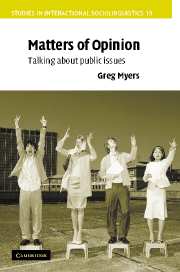Book contents
- Frontmatter
- Contents
- Acknowledgments
- Transcription conventions
- Focus-group data
- 1 Paradoxes of opinion
- 2 A tool kit for analysing group discussions
- 3 Forums for opinion: ‘What is it that's going on here?’
- 4 Institutions of opinion: voice of the people?
- 5 Topics in interaction: ‘Why that now?’
- 6 Agreeing and disagreeing: maintaining sociable argument
- 7 Representing speech: other voices, other places
- 8 Questioning expertise: Who says?
- 9 Radio phone-ins: mediated sociable argument
- 10 Vox pop television interviews: constructing the public
- 11 Opinions as talk
- References
- Index
2 - A tool kit for analysing group discussions
Published online by Cambridge University Press: 22 September 2009
- Frontmatter
- Contents
- Acknowledgments
- Transcription conventions
- Focus-group data
- 1 Paradoxes of opinion
- 2 A tool kit for analysing group discussions
- 3 Forums for opinion: ‘What is it that's going on here?’
- 4 Institutions of opinion: voice of the people?
- 5 Topics in interaction: ‘Why that now?’
- 6 Agreeing and disagreeing: maintaining sociable argument
- 7 Representing speech: other voices, other places
- 8 Questioning expertise: Who says?
- 9 Radio phone-ins: mediated sociable argument
- 10 Vox pop television interviews: constructing the public
- 11 Opinions as talk
- References
- Index
Summary
The transcriber of our focus-group tapes broke down at one point and recorded several minutes of talk with the words, ‘STILL MORE ABOUT RUBBISH BINS’. Any of us who read this particular set of transcripts, with its repetitive complaints about local government services, can sympathize with her exasperation. But we might wish for a rather more detailed account than this curt summary.
This transcription is an extreme case of what I noted in Chapter 1, the way researchers reduce transcripts to content categories, losing the details of talk. I argued there for analysis that would tell us about how people said things as well as about what they said. This chapter introduces some of the tools used for analysing group discussions, in conversation analysis, discourse analysis, pragmatics, and rhetoric. Instead of introducing each of these fields of research separately, I will look at the same passage in various ways. I will start with one participant's statement of an opinion, as it appears in a transcript, and the ways it might be coded. Then I will give a much more detailed transcription, including what was said by the preceding and following speakers, and consider some aspects of turn-taking, to see how this utterance was elaborated, echoed, and transformed. But I would also like to go beyond conversation analysis to look at how words and sentences relate to what we know about the structure of language, and to identify uses of persuasive language such as commonplaces.
- Type
- Chapter
- Information
- Matters of OpinionTalking About Public Issues, pp. 22 - 46Publisher: Cambridge University PressPrint publication year: 2004



